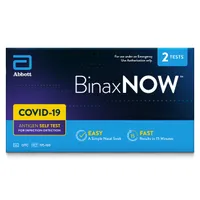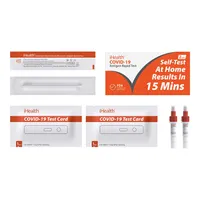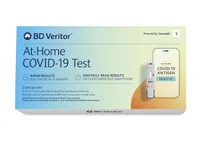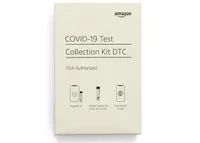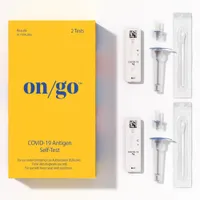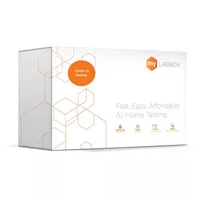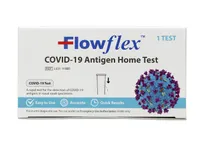Where can I buy a rapid Covid test — everything you need to know
These over-the-counter tests can be taken at home
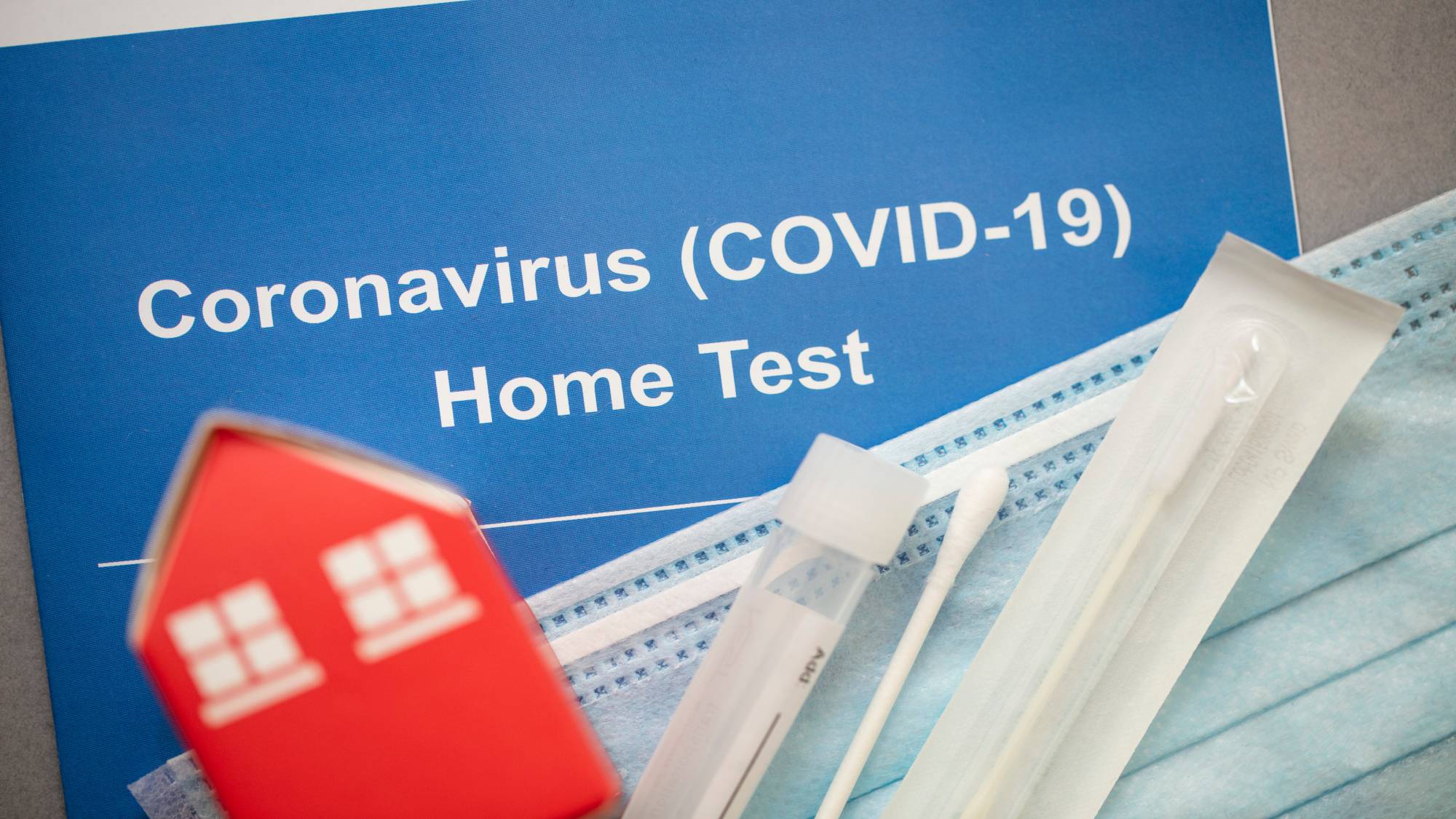
Although Covid-19 cases are starting to plateau, some individuals may still be looking for where to buy rapid Covid tests online. These at-home Covid tests offer fast results and are more convenient than traveling to a point-of-care test center. The Biden administration has made it easy for Americans to get free at-home Covid-19 test kits. (Check out our coverage on how to get a free at-home Covid-19 test kit). Combined with vaccines and face masks, they can help reduce the spread of the contagious Omicron variant, according to the CDC.
Whether you're heading back to school, the office, or getting together with family, we've created a guide on where to get rapid Covid tests online. In most cases, the kits can be purchased at your local pharmacy or big-box retail stores. However, stock may vary based on your location. (Also, make sure to check out what we know so far about the symptoms of the Omicron variant).
Where to buy rapid Covid tests
- Amazon: iHealth, DxTerrity, Amazon, and more
- CVS: PCR/Rapid antigen tests available from Pixel, QuickVue, Abbot
- Kroger: BinaxNow and Kroger kit
- Sam's Club: On-Go and BinaxNow
- Target: EverlyWell and ellume
- Walgreens: BinaxNow and QuickVue
- Walmart: Simplicity, DxTerrity, BinaxNow, QuickVue, more
Where to get rapid Covid tests
Read moreRead less▼
BinaxNow: for $19 @ Walmart
Select Walmart locations have stock of the FDA-authorized Abbott BinaxNow rapid self-test. The test offers results within 15 minutes of swabbing your nose and inserting the sample into the test card. It can detect multiple strains, including the omicron variant. Amazon also offers it for $20. It normally sells for about $24 in most pharmacies.
Read moreRead less▼
iHealth Covid-19 Rapid Test: for $15 @ Amazon
The iHealth Covid-19 Rapid Test includes two tests in each kit. The FDA-authorized test provides results in 15 minutes. The self-administered test claims to be comfortable as it doesn't require a deep nasal swab.
Read moreRead less▼
BD Veritor Digital Test: was $33 now $20 @ Amazon
The FDA-authorized BD Veritor Digital Test uses a smartphone to interpret and deliver results in as little as 15 minutes. The kit includes two at-home Covid tests (with nasal swabs) and works with the free Scanwell Health app, which provides simple, step-by-step instructions and digitally displays your results.
Read moreRead less▼
Amazon Covid-19 Test Kit: for $39 @ Amazon
Amazon offers an FDA-authorized at-home Covid-19 test. You'll get results within 24 hours of your sample arrive at the lab. (A pre-paid next-day shipping label is included with the kit).
Read moreRead less▼
On-Go Covid-19 Self Test: for $29 @ Walmart
The On-Go Covid-19 self test promises results in as little as 10 minutes. The FDA-authorized test claimed to be 95% accurate and can detect strains such as the Delta variant. The kit includes two tests.
Read moreRead less▼
My LabBox Covid Test: for $109 @ Sam's Club
The My LabBox FDA-authorized rapid Covid test uses a PCR shallow nasal swab to detect Covid infection. Samples must be returned to a lab for testing. Lab results are shared within 24 to 48 hours from receipt of sample.
Read moreRead less▼
FlowFlex COVID-19 Antigen Home Test: for $9 @ Walgreens
As one of the most affordable at-home Covid-19 tests, the FlowFlex is hard to find in stock online. However, select Walgreens locations have it in-stock and available via in-store pickup. The FDA-authorized test offers results in 15 minutes.
How much do at-home Covid-19 tests cost?
Americans with private insurance can now ask their insurance provider for reimbursement for any rapid at-home Covid-19 tests purchased on or after January 15, 2022. Individuals will likely have to log onto their insurance provider's website to file a claim. (The process may be different based on your insurance).
White House officials announced that you'll be able to buy up to eight tests/kits a month per person covered by the insurance policy. Insurance providers will cover any over-the-counter Covid-19 test that has received emergency use authorization (EUA) by the FDA. (You can find a full list of covered tests here).
How much do Covid-19 tests cost without insurance?
If you're not insured — or if you're covered by Medicare — the Biden administration has launched a website (https://www.covidtests.gov) where you can now request free at-home Covid-19 tests delivered to your home. (Find out how to get a free at-home Covid-19 test kit).
U.S. health officials say they will distribute about 500 million rapid Covid-19 tests free to anyone who request them.
Additionally, retailers like Amazon, Walmart, and Kroger will sell at-home tests at-cost for the next few months. Community heath centers and food banks across the country are also expected to receive at-home tests, which they'll distribute for free to communities in need.
It's also worth noting that some states — such as Massachusetts, Rhode Island, and New Jersey — are partnering with select laboratories to offer their own free at-home Covid tests. New Jersey, for instance, is teaming up with Vault Medical Services to offer free at-home Covid tests for NJ residents. The tests will arrive at your home with free expedited shipping and you'll be able to get your results in as fast as 48 hours. More states will like offer rapid Covid tests in the days to come.
How accurate are rapid Covid tests?
Some rapid Covid tests claim to be around 85% accurate at detecting traces of the virus. However, real-word studies posted by the CDC have shown their accuracy to be even lower. Meanwhile, other studies have shown that results could be more accurate for symptomatic individuals versus those who are asymptomatic. Likewise, the tests are more sensitive during the first week of symptoms.
How long does it take to get Covid test results?
Most at-home Covid-19 tests require the collection of a nasal specimen or saliva specimen. While many tests can offer results in minutes, others may require that you mail back your specimen to a laboratory. (The FDA has a list of at-home tests it authorized for emergency use).
While it's a good idea to have tests stored at home should you need them, it's also important to remember some tests expire. The CDC has a hub where it offers tips on how to perform a self-test, collect a specimen, and what to do if your test is positive.
Get instant access to breaking news, the hottest reviews, great deals and helpful tips.

As deals editor-in-chief at Tom’s Guide, Louis is constantly looking for ways to avoid paying full price for the latest gadgets, appliances, and apparel. With over 10 years of deals-hunting experience, Louis price checks against multiple retailers and searches high and low for the best deals to bring readers. He's also always on the look out for the best coupon codes to use when shopping. A born-and-bred New Yorker, Louis is also an avid swimmer and marathoner. His work has appeared on Gizmodo, CNET, and Time Out New York.
 Club Benefits
Club Benefits





